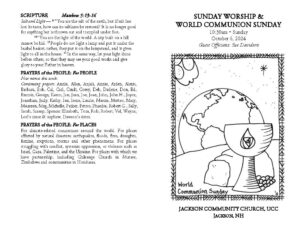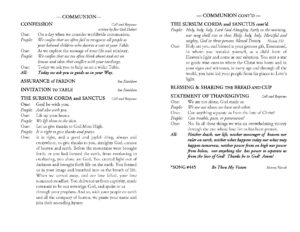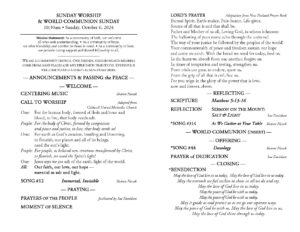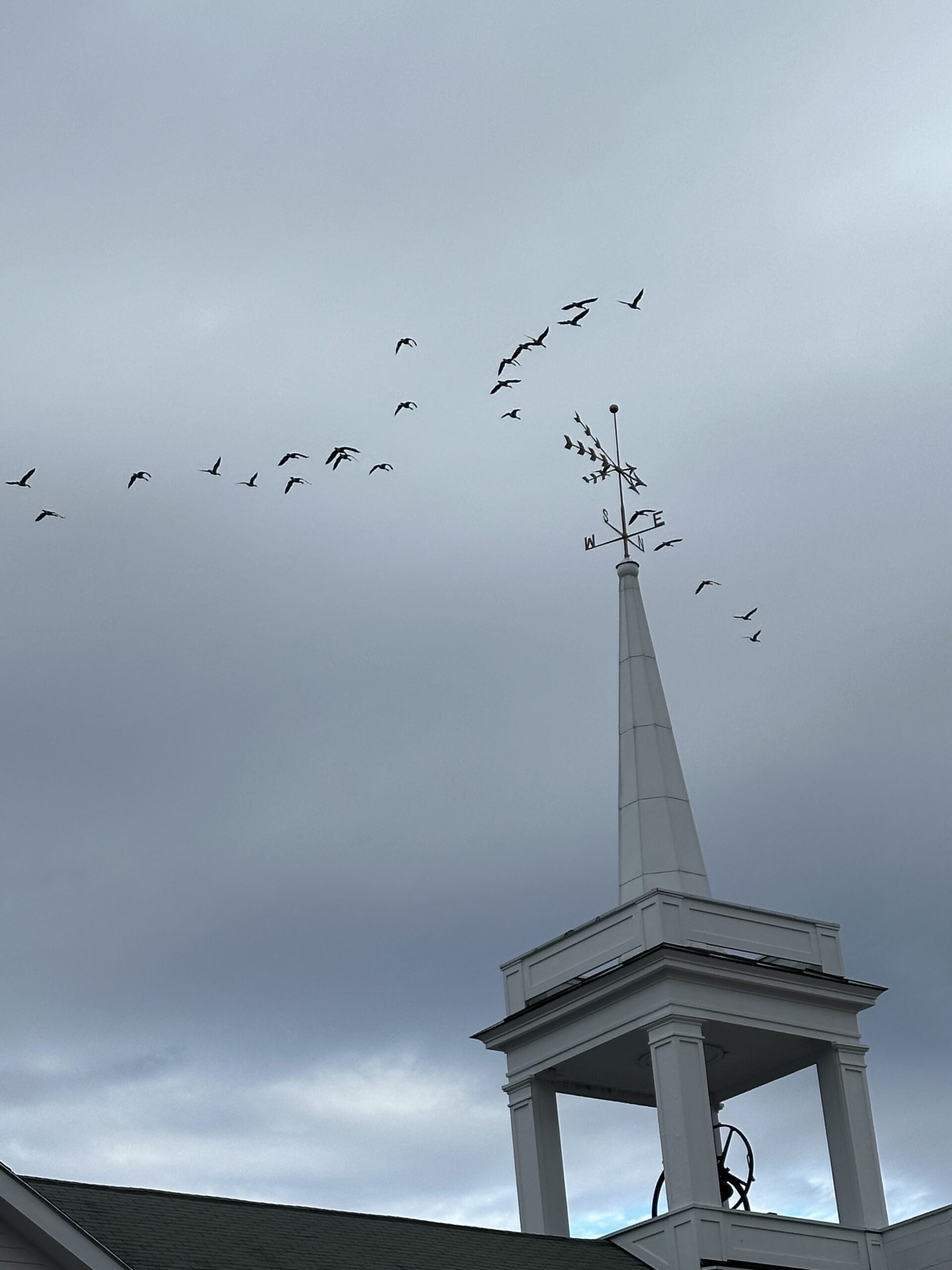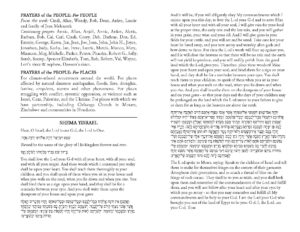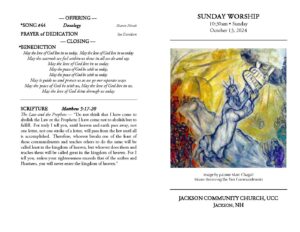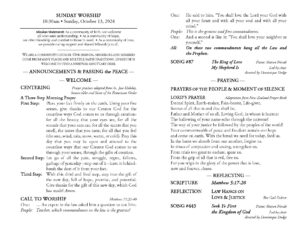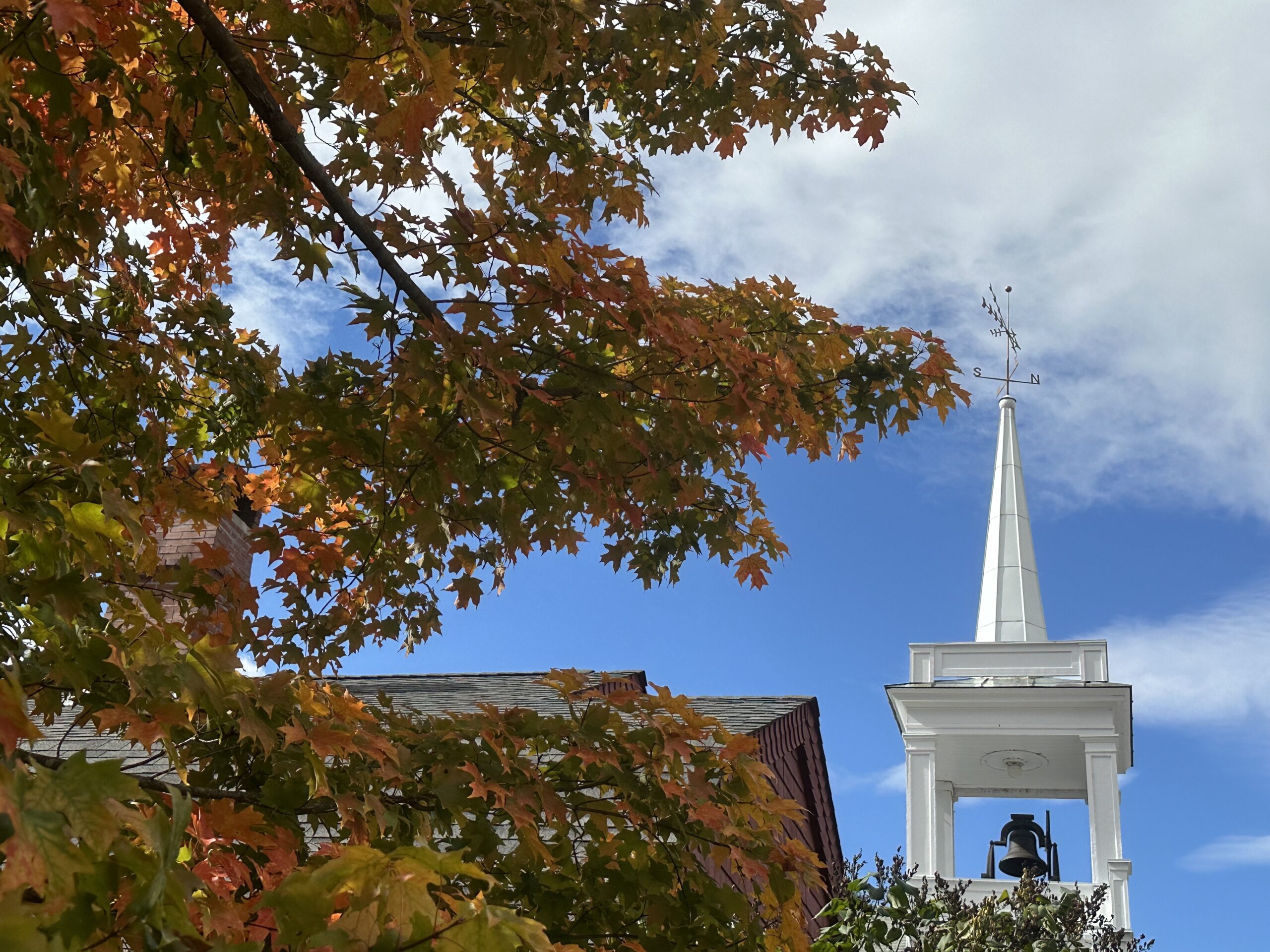10:30am Worship on Sunday, Oct 20
Bulletins for Service (pdf and jpg): 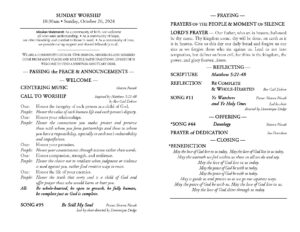
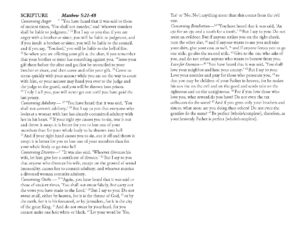
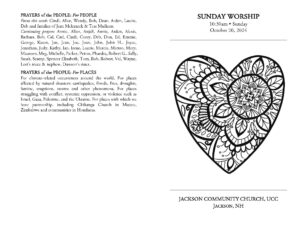
Events with JCC and around town: Thurs, Oct 17 – Mon, Oct 21
THURS, Oct 17
- Community Event: FREE STORE MEETING
4pm • JCC- The Free Store Group is meeting 4 pm on Thursday October 17th at the Jackson Community Church. Any one interested in the re-opening of the store at the transfer station is welcome.
- Community Event: NATURE in FOCUS
7pm • Tin Mountain in Albany- Register / Add To My Calendar
- Photographer and author Bob Fleck with lead viewers through the marvels available to us to witness in the natural world and bringing it into focus via photography and patience. Many of the images featured in the program are from Seasons At A New England Bog, a photographic essay of Quincy Bog in the southwest corner of the White Mountain National Forest. Bob will discuss the importance of conserved wetlands for fall migrants as well as resident species. Join us for the Exploration of the area’s marvels.
- Community MUSIC & ENTERTAINMENT around town:
- Shannon Door: Jeremy Dean • 6-9pm
- Shovel Handle Pub: Michael Loughlin • 6-9pm
- Ledge Brewing: Special Trivia – Are You Msarter than an 8th Grader? • 6-8pm
FRI, Oct 18
- Community Resource: LIBRARIES
2-5pm • Jackson Library (more info: https://jacksonlibrary.org/) - Community Event: MAJESTIC CAFE FRIDAY NIGHT JAZZ: Dave Trooper, Fabio Gutierrez, & Justin Ramos
7pm • Majestic Cafe, Conway- Walk-ins are always welcome, but space is limited; reservations are available to guarantee your seat and to indicate a seating choice.
- The Friday Night jazz series has a $10 per person cover charge.
- Doors at 6 pm; music at 7pm.
- Come in early and grab a panini before the music starts
- Info and tickets:: https://www.conwaymajestic.com/cafe
- The Majestic Cafe has tables for parties of 2 and a limited number of tables for 3 or 4. If you are a party larger than 4, some of your party will be seated at a different table. Please note that on busy nights you may be seated at a table with another party.
- Private Event: WEDDING REHEARSAL
4pm • JCC Sanctuary- Wedding party only
- C3: Cocktails & Christian Conversations
Resumes next Friday - Community MUSIC & ENTERTAINMENT around town:
- Wildcat Tavern: Al Shafner • 6:30pm
- Red Parka: Stray Dog • 8-11pm
- Shannon Door: Dan Aldrich • 6-9pm
- Ledge Brewing: Food for Bears • 6-8pm
- Shovel Handle: Ryan St Onge • 6-9pm
SAT, Oct 19
- Community Event: CELEBRATE WHITE MOUNTAIN ART at White Mountains Gallery and Erik Koeppel’s Open Studio
- Gallery
10am-4pm • Paul Mayer’s White Mountain Museum & Gallery, 2541 White Mountain Highway, North Conway- In addition to the art for sale in the Gallery, the Museum displays over 80 White Mountain landscapes from the 1800s. See https://whtmtn.art/ for information on the gallery. There are two opportunities to view 19th century or 19th century Revival Style White Mountain Art this weekend, Saturday and Sunday October 19th and 20th. In Jackson artist Erik Koeppel and in North Conway Paul Mayer, owner of the White Mountain Museum and Gallery, will open their venues free of charge with any art sales to benefit the Jackson Historical Society’s campaign to Rescue, Restore, and Renovate Jackson’s historic Town Hall.
- Serving light hors d’oeuvres and fresh apple cider.
- Open Studio with Erik Koeppel
1-3pm • Studio- Jackson artist Erik Koeppel will open his studio both days from 1:00pm – 3:00pm.
- Erik is nationally renowned, featured in many art magazines and has been awarded many honors. His studio features both finished paintings and work in process.
- For reservations (no charge) and directions contact info@jacksonhistory.org or eeekoeppel@gmail.com
- See https://www.erikkoeppel.com/ for more information about Erik.
- Gallery
- Private Event: WEDDING
4pm • JCC Sanctuary- Wedding guests only
- Community Event: HALLOWEEN HOOTS
5pm • Tin Mtn Conservation Ctr, Albany- Register / Add To My Calendar
- Back by popular demand! This celebration of nocturnal nature is fun for the whole family. Sign up for a time slot and travel the festive trail with a Tin Mountain guide, visiting stops along the way and culminating with cider and sweet treats around the campfire. Stations will entertain and educate participants. There is no scary or spooky content included in the skits and the path will be illuminated with beautifully carved pumpkins to light the path for those who may be uncomfortable in the dark.
- We anticipate this event will sell out, so be sure to sign up early!
- Timeslots: Every 20 minutes 5-7pm.
- Please note the trail will take approximately 1 hour to complete.
- Pricing:
- TMCC Member $10/person, $25/household
- Non-member: $15/person, $35/household
- Family/household pricing is for 2 adults and up to 3 children
- Community Event: FLOODING the VALLEY with MUSIC
7pm •Majestic Theater- An exciting variety show with many local artists to benefit and assist with flood recovery at the Conway Village Congregational Church (the “Brown Church”).
- Info and tickets: https://www.conwaymajestic.com/
- Featuring:
- DellaValla Trio
- Andriana
- Another Story
- Katherine Rhoda
- Simon Crawford
- Dana Cunningham
- Click “learn more” above for more information about the artists!
- Community Resource: LIBRARIES
- 10am-2pm • Jackson Library
Contact the library for additional help: 603.383.9731 or by email: staff@jacksonlibrary.org - 11am-3pm • Bartlett Library
More info: https://www.bartlettpubliclibrary.org/
- 10am-2pm • Jackson Library
- Community Event: OPEN HOURS @ Jackson Historical Society
9am-3pm • Jackson Historical Society- Also open by appointment.
More info: https://www.jacksonhistory.org/
- Also open by appointment.
- Community MUSIC & ENTERTAINMENT around town:
- Shannon Door: Al Shafner • 7-10pm
- Red Parka: Stray Dog • 8-11pm
- Wildcat Tavern: Randy Messineo • 7pm
- Ledge Brewing: BlueGrit • 6-9pm
SUN, Oct 20
- INTERFAITH GATHERING
8am • Outside or indoor at Old red Library (weather determines location)- Join us for poetry, prayer, and conversation
- CHOIR REHEARSAL with Dominique Dodge & Sharon Novak
9:15am • Jackson Community Church & Zoom
- Choir-building this autumn: Oct 13, Oct 20 and Nov 3 (Sundays)
- Come if you love to sing! All ages and skill levels wanted!
- WORSHIP
10:30am • Jackson Community Church & Zoom- Join us for song, prayer, scripture and message
- Livestreaming to Facebook & jxncc.org (church website)
- Music by Sharon Novak
- Theme: Sermon on the Mount
- Message: rev Gail Doktor
- HOSPITALITY following church
11:30am • Parish Hall - WAKE / VISITING HOURS for Tess Mulkern
1-4 pm. • Furber Funeral Home, North Conway - Community Event: PING PONG TOURNAMENT
3-5pm • Whitney Community Center, Jackson, NH 03846 - Community Event: HURRICANE RELIEF POP-UP CONCERT with Bennett & Perkins, Seth Gallant & the Heather Pierson Trio
4pm • Majestic Cafe- The Majestic Cafe will open at 3 PM for wine, beer, craft cocktails and mocktails, selected soft drinks and bottled water. Enjoy drinks at your seat in our customized spill-proof cups – bring your own, or purchase a new one!
- Hurricane Relief Benefit with Bennett & Perkins, Seth Gallant & the Heather Pierson Trio
- A pop-up concert to benefit relief for the areas hit by recent hurricanes! Featuring performances by local duo Kathy Bennett & Thom Perkins with Taylor Whiteside, Maine singer/songwriter/folk artist Seth Gallant, and Majestic Cafe favorites the Heather Pierson Trio.
- Enjoy an afternoon of music and help bring important food relief to hurricane victims in the Southwest.
- All artists have waived their usual fees, and the Majestic has donated the use of its facilities. Proceeds will benefit the programs of World Central Kitchen, a well-established charity that provides food relief in the U.S. and across the world.
- General admission; $10 minimum, with larger amounts gratefully accepted.
- Can’t attend but want to help? DONATE HERE
- Community Event: CELEBRATE WHITE MOUNTAIN ART at White Mountains Gallery and Erik Koeppel’s Open Studio
- Gallery
10am-4pm • Paul Mayer’s White Mountain Museum & Gallery, 2541 White Mountain Highway, North Conway- In addition to the art for sale in the Gallery, the Museum displays over 80 White Mountain landscapes from the 1800s. See https://whtmtn.art/ for information on the gallery. There are two opportunities to view 19th century or 19th century Revival Style White Mountain Art this weekend, Saturday and Sunday October 19th and 20th. In Jackson artist Erik Koeppel and in North Conway Paul Mayer, owner of the White Mountain Museum and Gallery, will open their venues free of charge with any art sales to benefit the Jackson Historical Society’s campaign to Rescue, Restore, and Renovate Jackson’s historic Town Hall.
- Serving light hors d’oeuvres and fresh apple cider.
- Open Studio with Erik Koeppel
1-3pm • Studio- Jackson artist Erik Koeppel will open his studio both days from 1:00pm – 3:00pm.
- Erik is nationally renowned, featured in many art magazines and has been awarded many honors. His studio features both finished paintings and work in process.
- For reservations (no charge) and directions contact info@jacksonhistory.org or eeekoeppel@gmail.com
- See https://www.erikkoeppel.com/ for more information about Erik.
- Gallery
- Community Event: OPEN HOURS @ Jackson Historical Society
1-3pm • Jackson Historical Society (Also open by appointment.)- More info: https://www.jacksonhistory.org/
- Community MUSIC & ENTERTAINMENT around town:
- Shannon Door: Jeremy Dean • 6-9pm
- Red Parka: Blue Sunday with John Lackard Band • 5-8pm
MON, Oct 21
- MASS for Tess Mulkern
11am • Our Lady of the Mountains- Services are being planned for Mom Sunday Oct. 20th calling hours in the early afternoon at Furbers and Monday Oct. 21st for a late morning funeral service at Our Lady of The Mt’s Details with times to follow.
- Community MUSIC & ENTERTAINMENT around town:
- Shannon Door: The Family Van • 6-9pm
10:30 am Worship on Sunday, Oct 13
Events with JCC and around town: Fri, Oct 11 – Tue, Oct 15 (Indigenous Peoples Day/Columbus Day Weekend)
Fri, Oct 11 – Tue, Oct 15
(Indigenous Peoples Day/Columbus Day Weekend)
(Indigenous Peoples Day/Columbus Day Weekend)
FRI, Oct 11
- FITNESS CLASS with Laurie McAleer

9:30am • Jackson Community Church- Free to all participants.
- Gentle, chair-based stretch and fitness for all levels of ability
- Community Resource: LIBRARIES
2-5pm • Jackson Library (more info: https://jacksonlibrary.org/) - Community Event: MAJESTIC CAFE FRIDAY NIGHT JAZZ: Al Hospers with Jarrod Taylor & Craig Bryan
7pm • Majestic Cafe, Conway- Walk-ins are always welcome, but space is limited; reservations are available to guarantee your seat and to indicate a seating choice.
- The Friday Night jazz series has a $10 per person cover charge.
- Doors at 6 pm; music at 7pm.
- Come in early and grab a panini before the music starts
- Info and tickets:: https://www.conwaymajestic.com/cafe
- The Majestic Cafe has tables for parties of 2 and a limited number of tables for 3 or 4. If you are a party larger than 4, some of your party will be seated at a different table. Please note that on busy nights you may be seated at a table with another party.
- C3: Cocktails & Christian Conversations
5pm • Zoom- Prepare your favorite beverage and join us via zoom to discuss this week’s scripture
- Zoom
- Join Zoom Meeting (link required)
- Community MUSIC & ENTERTAINMENT around town:
- Wildcat Tavern: Al Shafner • 6:30pm
- Red Parka: My Cousins Band • 8-11pm
- Shannon Door: Sheehan & Holden • 6-9pm
- Ledge Brewing: Food for Bears • 6-8pm
- Shovel Handle: Ryan St Onge • 6-9pm
- Community Resource: SLIDE DECK from NH EXECUTIVE COUNCIL Presentation
- What’s the New Hampshire Executive Council? Slide Deck
- For those of you who could not attend the Whitney Community Center’s What’s the New Hampshire Executive Council? program, you can Click Here to review the slide deck presented by Megg Acquilano of NH Together.
- The New Hampshire Executive Council plays a significant role in New Hampshire decision making and planning, so take a few minutes to educate yourself before heading to the polls on November 5th.
SAT, Oct 12
- MENS’ BREAKFAST
7:30am • JCC Parish Hall

- Join us for delicious breakfast made by chef Chris Doktor plus good conversation and friendship
- Open to friends and members of JCC
- Community Event: FALL POP-UP ART SHOW
10am-7pm • Wentworth Inn Tent- Join us for our 5th Annual FALL Pop-Up Art Show this weekend at the at the Wentworth Inn Tent on Oct 12 & 13. 2024.
- Open 10am-7pm on Saturday with our “meet the artists”reception from 5-7pm. The show continues on Sunday, Oct 13 from 10am-5pm.
- Featuring the work from 18+ local artists with mediums in oils, acrylic, pastels, watercolor, mixed media, woodblock prints and more! Free and open to the public
- Community Event: GIBSON CENTER CRAFT FAIR
10am-5pm • Gibson Center, North Conway- Saturday the 12th & Sunday the 13th will be our final Craft Fair of the season.
- If you haven’t purchased that special something for someone in your life, make sure you make it to the Craft Fair, from 10-5 on Saturday, and 9-4 on Sunday.
- Community Resource: LIBRARIES
- 10am-2pm • Jackson Library
Contact the library for additional help: 603.383.9731 or by email: staff@jacksonlibrary.org - 11am-3pm • Bartlett Library
More info: https://www.bartlettpubliclibrary.org/
- 10am-2pm • Jackson Library
- Community Event: OPEN HOURS @ Jackson Historical Society
9am-3pm • Jackson Historical Society-
Also open by appointment.
More info: https://www.jacksonhistory.org/
-
- Community EventL ATTITASH OKTOBERFEST
11am-5pm • Attitash Mountain | Bartlett, NH-
Price: $10.00 to $50.00—Age 6 and under are free. / Get Tickets
Oktoberfest returns to Attitash on October 12, 2024, at the Attitash Base Area. Make unforgettable memories as we celebrate the season. It features traditional Polka music from the world-renowned Eastern Sound Orchestra, authentic German fare, and a Biergarten. Oktoberfest features a wide variety of activities for kids and adults. Partake in a friendly competition of Stein Hosting and Keg Toss. Families can enjoy the dedicated Kinderplatz area. Stay tuned for more details!
-
- Community Event: JONATHAN SARTY & NEW COUNTRY GENTLEMEN: A Nashville Revue
7-9pm • Majestic Theater- Tickets:https://www.eventbrite.com/e/a-nashville-revue-tickets-1009299200077
- Get ready for a night of country music, humor, history, and good ol’ fashioned fun at A Nashville Revue!
- Join us at The Majestic Theatre for A Nashville Revue! Get ready to experience a taste of Nashville right here in town. This in-person event promises to be a night you won’t forget, celebrating the history and legendary heros of Early American Country Music as Jonathan Sarty and the New Country Gentlemen perform the music of Hank Williams, Johnny Cash, Merle Haggard, Kris Kristofferson, Willie Nelson, George Jones, Marty Robbins, Elvis Presley and others. Add this date to your calendars and get ready for a little taste of Nashville right in your backyard!
- Community Event: NEXT STOP COMEDY NIGHT
8pm • Ledge Brewing- Next Stop! – A Comedy Show Near You! Join us at Ledge Brewing Company for a brand new line-up of comedians every time! Next Stop Comedy brings top stand-up comedians to your favorite local venues! Each show features a novel line-up with acts seen on TV and heard on your favorite podcasts. Join us at Ledge Brewing Company in Intervale, NH! – 15 Townhall Rd, Intervale, NH 03845 For more info, check out our website! – nextstopcomedy.com*Formerly Boston Comedy Club
- Community MUSIC & ENTERTAINMENT around town:
- Shannon Door: Mitch Alden • 7-10pm
- Red Parka: Al Shafner • 8-11pm
- Wildcat Tavern: Carlos Angelos Olmeda • 7pm
- Ledge Brewing: Next Stop Comedy Night •8pm
SUN, Oct 13
- INTERFAITH GATHERING
8am • Outside or indoor at Old red Library (weather determines location)- Join us for poetry, prayer, and conversation
- CHOIR REHEARSAL with Dominique Dodge & Sharon Novak

9:15am • Jackson Community Church & Zoom- Choir-building this autumn: Oct 13, Oct 20 and Nov 3 (Sundays)
- Come if you love to sing! All ages and skill levels wanted!
- WORSHIP
10:30am • Jackson Community Church & Zoom- Join us for song, prayer, scripture and message
- Livestreaming to Facebook & jxncc.org (church website)
- Music by Sharon Novak
- Theme: Sermon on the Mount
- Message: rev Gail Doktor
- HOSPITALITY following church
11:30am • Parish Hall - Community Event: FALL POP-UP ART SHOW
10am-5pm • Wentworth Inn Tent- Join us for our 5th Annual FALL Pop-Up Art Show this weekend at the at the Wentworth Inn Tent on Oct 12 & 13. 2024.
- Featuring the work from 18+ local artists with mediums in oils, acrylic, pastels, watercolor, mixed media, woodblock prints and more! Free and open to the public
- Community Event: GIBSON CENTER CRAFT FAIR
9am-4pm • Gibson Center, North Conway- Saturday the 12th & Sunday the 13th will be our final Craft Fair of the season.
- If you haven’t purchased that special something for someone in your life, make sure you make it to the Craft Fair,
- Community Event: RECOGNITION of VOLUNTEERS of the YEAR
3pm • Bartlett Congregation Church, Bartlett

- Valley Promotions recognizes several volunteers of the year
- Our own Sue Carrigan will be recognized as a Way Station volunteer!
- Come and celebrate our unsung heroes!
- Community Event: AUTUMN EXPLORATION
- Community Event: OPEN HOURS @ Jackson Historical Society
1-3pm • Jackson Historical Society (Also open by appointment.)- More info: https://www.jacksonhistory.org/
-
Community Event: FALL GENRE Author Series with White Birch Books – Author Kristyn J Miller
- Free
- Kristyn Miller – Fall Author Series with White Birch Books at the Pope Memorial Library, 3 pm Meet the author at the library, enjoy a book talk and then cross the street to Chef’s Bistro for a novel signature cocktail and more conversation with the author.
- For more information, call 603-356-2961 or info@whitebirchbooks.com
- Community MUSIC & ENTERTAINMENT around town:
- Shannon Door: Dan Parkhurst & Rafe • 6-9pm
MON, Oct 14 – Indigenous Peoples’ Day / Columbus Day
- Town offices closed
- Community MUSIC & ENTERTAINMENT around town:
- Shannon Door: The Family Van • 6-9pm
TUE Oct 15
- CELEBRATION of LIFE for Jean Melczarek
2-6pm • Red Parks

Worship & World Communion Celebration on Sunday, Oct 6 with guest preacher Sue Davidson
Livestream from JCC sanctuary:
Bulletins for Service (pdf and jpg): 